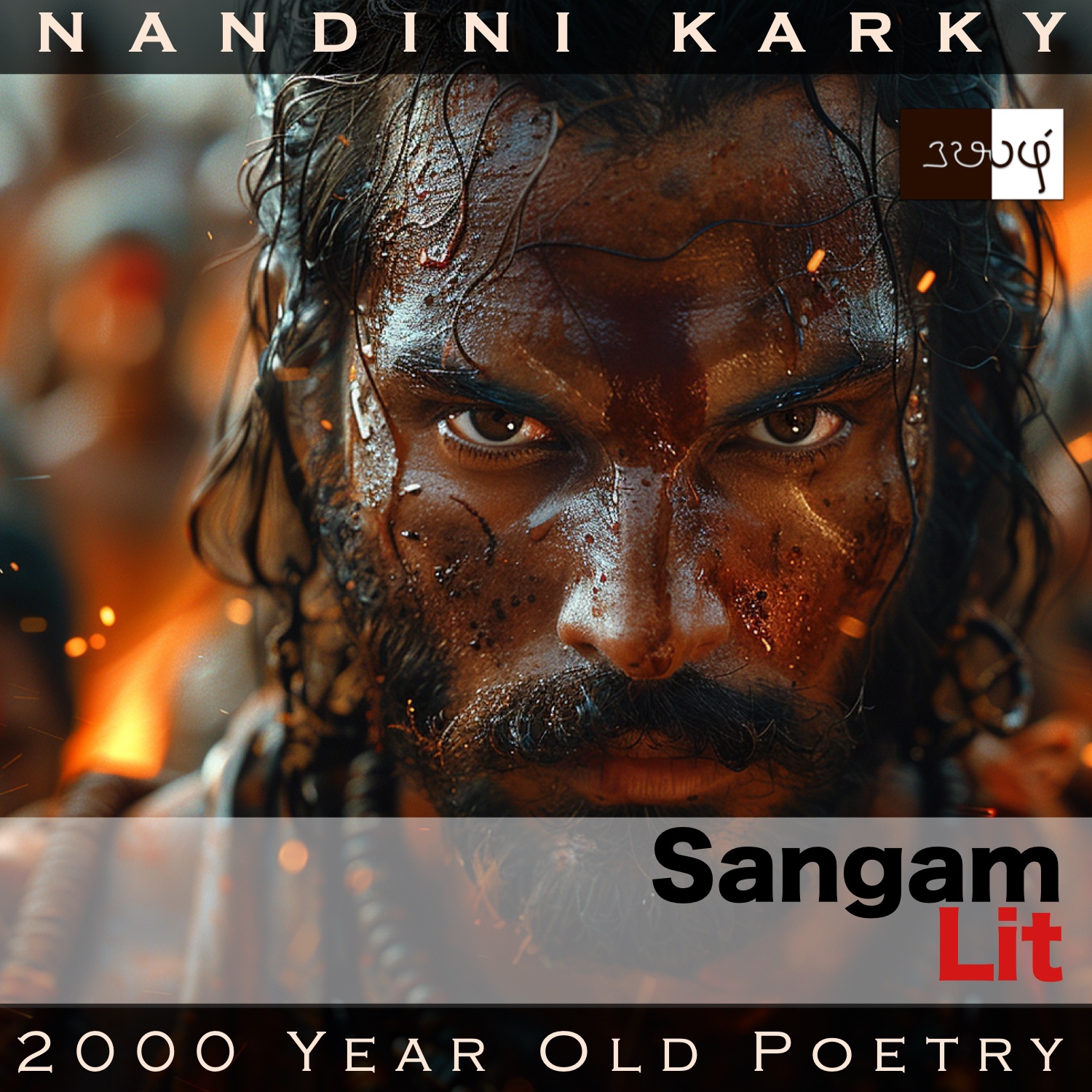Podcast: Play in new window | Download
Subscribe: Apple Podcasts | Spotify | Amazon Music | Android | iHeartRadio | TuneIn | RSS | More
In this episode, we perceive a battlefield ritual, as depicted in Sangam Literary work, Puranaanooru 372, penned for the Pandya King Thalaiyaalankaanathu Cheruvendra Nedunchezhiyan by the poet Maankudi Kizhaar. The verse is situated in the category of ‘Vaagai Thinai’ or ‘Victory’ and reveals a poet’s reason for arriving in a battle zone.

விசி பிணித் தடாரி விம்மென ஒற்றி,
ஏத்தி வந்தது எல்லாம் முழுத்த
இலங்கு வாள் அவிர் ஒளி வலம் பட மின்னி,
கணைத் துளி பொழிந்த கண்கூடு பாசறை,
பொருந்தாத் தெவ்வர் அரிந்த தலை அடுப்பின்,
கூவிள விறகின் ஆக்கு வரி நுடங்கல்,
ஆனா மண்டை வன்னிஅம் துடுப்பின்,
ஈனா வேண்மாள் இடம் துழந்து அட்ட
மா மறி பிண்டம் வாலுவன் ஏந்த,
‘வதுவை விழவின் புதுவோர்க்கு எல்லாம்
வெவ் வாய்ப் பெய்த பூத நீர் சால்க’ எனப்
புலவுக் களம் பொலிய வேட்டோய்! நின்
நிலவுத் திகழ் ஆரம் முகக்குவம் எனவே.
A relatively shorter song in this series on the ruthlessness of the battlefield but no less gory. The poet’s words can be translated as follows:
“Beating my well-tied thadari drum and making it resound aloud, I came here praising you. Here, where shining swords, radiant like stars, glowed with victory and arrows rained down in this encampment with assembled warriors. Making the severed heads of disagreeable enemies as the stove and with the branches of the ‘koovilam tree’ as firewood, cooking the intestines and the endless offering of skulls with the ladles of ‘vanni tree’, the ghost maiden stirred the food that even flesh-eating animals refuse to eat. Raising this to the skies and declaring, ‘may this be blessed like the special water sprinkled on arriving guests from the pot with a narrow spout in wedding festivals’, you glorified this flesh-reeking battlefield with the sacrificial ritual, O lord! I came here to obtain your necklace, akin to the moon, as my reward!”
Time to explore the details. The poet starts by saying that he arrived at the battlefield beating his drum and praising this king for a specific reason. Without directly saying what that it is, he goes on to talk about the glowing swords and raining arrows. Then, he switches gears and talks about the actions of ghost maiden, who seem to be cooking with the skulls of dead enemies as stoves, using the firewood of the ‘bael tree’, and stirring the scattered intestines with the ladle of the ‘mesquite tree’ and making this into a ball of meat that even carnivorous animals avoid. Sensible creatures, these animals indeed! Then, the poet explains how this is a ritual done by the king to the God of Death, and he equates the offering to the showering of blessed water on people, who arrive at weddings! As a side note, that line about weddings and sprinkling of water reminded me of this custom of sprinkling perfumed water called as ‘panner’ on guests in South Indian weddings, which goes on to this day.
Returning to our poet, he’s wrapping up the story saying he has come to this battlefield that the king has glorified with his copious sacrifice, just to get the glowing, moon-like necklace of the king. These poets are really honest and we have to appreciate how they are clear about what they want! This particular poet is also not hankering after elephants as we have seen so far and is content with just the Pandya king’s necklace, looks like!
Looking at this from a serious perspective though, a difficult song to accept indeed, because of the stark images of that battlefield ritual. However, it’s clear that this was a different time, a different tradition and we can come away with gratitude for gaining a little wisdom over the centuries and moving away from such ruthless glorification of war and violence!




Share your thoughts...